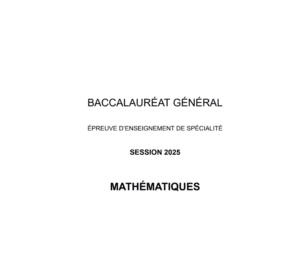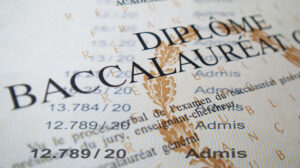Bac 2023. Dans cet article, nous te proposons un corrigé de l’épreuve de spécialité de LLCER anglais contemporain du mardi 21 mars 2023. Cette correction t’est proposée par Samantha Lemeunier, professeure agrégée d’anglais.
Bac 2023 : le sujet de l’épreuve de spécialité LLCER anglais contemporain
Bac 2023 : le corrigé de l’épreuve de spécialité LLCER anglais contemporain
Sujet 1
Le sujet 1 portait sur l’environnement et la région des Grands Lacs. Il fallait réussir à problématiser le sujet en fonction des éléments présents dans le dossier, mais également des éléments absents. L’idée était donc d’identifier l’orientation politique du dossier, qui était fortement orienté à gauche, pour ensuite être capable d’apporter une lecture critique des documents.
Partie 1 : proposition de corrigé
When declaring that he would fund the restoration of the Great Lakes area, Biden explained the problem: “Back in 1987, an independent commission identified 43 places called “areas of concern” along the Great Lakes. They’re areas where pollution, as — as the EPA director said, where pollution from industry, runoff from agriculture, poor wastewater treatment put the Great Lakes and everyone who depends on them at risk.” This is exactly what is represented in the set of documents under study. Indeed, document A is a cartoon representing a fisherman catching dead fish on Lake Erie due to pollution. Document B is an online article dating from 2019 about the legal rights of Lake Erie while document C is a more recent article published in The Washington Post explaining Biden’s funding in order to restore the Great Lake region. If document A tends to suggest that citizens should individually stop polluting the lakes, document B shows that legal measures will allow local governments to get rid of pollution while document C suggests that it is through investment that the problem of climate change will be solved. Therefore, how are environmental issues perceived and addressed in the Great Lakes area by citizens and authorities?
The problem of climate change is mainly addressed by Democrats in the United States. Indeed, the cartoon denouncing pollution in the Great Lakes area was published in an independent newspaper which has a left-wing bias, namely the Daily Telegram. Similarly, document B is an article from Vox, an online media which pertains to the left of the political spectrum. Therefore, the spreading of information and support for legal actions in favor of the protection of the environment and consequently of the Great Lakes area appears to by only the matter of approximately half of the U.S. inhabitants.
Yet, more bipartisanship appears through the economic interests that the environmental question underlie. Document C indeed explains that Biden’s funding of the restoration of the area is bipartisan (l. 2), which means that it is supported by both the Republican and the Democrats. Yet, if the Democrats tend to want to protect the environment, the Republicans are more into making economic profit. This is the reason why Biden’s proposal is both ideological and economic: every dollar spent on the restoration of the region will indeed bring about three or four dollars. More than a funding, Biden’s move therefore constitutes an investment.
All in all, the economic growth that can be produced by the fight against climate change is a game changer in the way environmental issues are perceived and addressed in the Great Lakes region, and Biden might eventually manage to solve the environmental culture war opposing the Republicans and the Democrats in the United States.
455 words
Partie 2 : proposition de traduction
Lors d’un discours à Lorain, ville en berge du lac Erie, Biden a déclaré que les subventions accélèreraient l’effort de restauration de lieux considérés comme des « zones en danger » dans la région car elles ont été polluées par l’agriculture et l’industrie. Ces subventions appuient un investissement lancé en 2010 et nommé l’Initiative de Restauration des Grands Lacs. « Ca va permettre une restauration des plus importantes dans l’histoire des Grands Lacs » a déclaré Biden devant une foule de plus de 60 invités.
Sujet 2
Le sujet 2 portait sur le Commonwealth. C’est un sujet extrêmement d’actualité, et il fallait analyser son évolution récente. Pour réussir ce sujet, il était donc nécessaire de bien comprendre les enjeux de la question (l’avenir du Commonwealth) mais également connaître, ou, du moins, conjecturer à partir du dossier, les changements récents du côté de la Couronne ainsi que le sentiment d’impérialisme dissimulé dans les pays du Commonwealth.
Partie 1 : proposition de corrigé
During his 2023 speech on Commonwealth Day, King Charles highlighted the unity of the Commonwealth: “Let ours be a Commonwealth that not only stands together, but strives together, in restless and practical pursuit of the global common good.” Yet, the set of documents under study seems to suggest that the Commonwealth is now a challenged institution. For instance, document A is a 2021 article from The Guardian dealing with the separation of Barbados from the British crown. Document B is also an article about the earthquake created by the death of Queen Elizabeth in 2022: more and more Commonwealth nations are thought to want to exit the association of countries. Finally, document C is a 2022 map representing the countries in which the British Crown, namely King Charles III, is head of state. Therefore, the three documents suggest that more and more countries are thinking about leaving the Commonwealth, hinting at an erosion of the relations between the United Kingdom and the Commonwealth. Is the Commonwealth going to disappear? Has it become an archaic association of countries? This essay will show that the common legacy on Commonwealth nations is questioned by current political challenges.
The Commonwealth is representative of the colonial past of the United Kingdom, and its existence is reminiscent of a period of Pax Britannica during which the British were the policemen of the world. This perception of the Commonwealth points towards a hierarchy between countries, which is well-represented by document C: the United-Kingdom occupies a central place on the map. This is the reason why document A quotes the words of Barbados’s Prime Minister when she said that she wanted “to fully leave our colonial pas behind” (l. 9). Similarly, document B explains that since the death of Queen Elizabeth, a desire to “strip away the vestiges of colonialism” (l. 3) has emerged.
Moreover, the death of Queen Elizabeth corresponds to the death of a symbol. If she used to travel the Commonwealth rather often when she was young and was thus rather appreciated by Commonweath nations, her successor, Prince Charles, never spent as much energy as her in winning the hearts of Commonwealth nations. Therefore, if Elizabeth was already perceived as “this sovereign who is not part of their reality” (l. 13, document A) by Commonwealth members, it is no surprise that Charles appears as a complete stranger. Moreover, since the monarch’s role is “mostly symbolic” (l. 15) according to document B, there is no use in maintaining him head of state in constitutional monarchies.
To conclude, even if some cultural habits inherited from British traditions remain in Commonwealth countries (notably “cricket” as mentioned on line 19 of document B), the political function of the Commonwealth has become completely obsolete and the symbol of unity that Queen Elizabeth embodied has disappeared. What Elizabeth II used to call “a family of nations” is thus on the verge of breaking.
483 words
Partie 2 : proposition de traduction
De nombreuses anciennes colonies britanniques restent liées entre elles par le Commonwealth, une libre association de 56 pays. La grande majorité d’entre eux est connectée par leur histoire commune et ont des systèmes juridiques et politiques similaires, tandis que l’organisation met à l’honneur les échanges au travers d’événements sportifs, culturels et éducatifs. L’association donne du prestige à ses membres, notamment en ce qui concerne les membres les plus petits et les plus récents, y compris les quelques pays africains qui n’étaient pas des colonies britanniques et qui ont rejoint l’association plus récemment.
Lire aussi : Bac 2023 : le corrigé de l’épreuve de LLCER anglais











